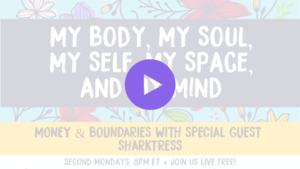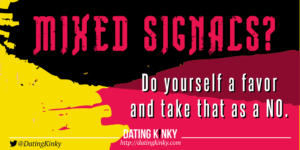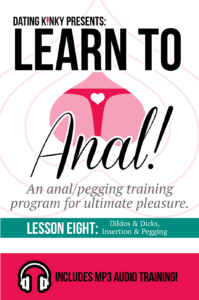What is vetting?
According to the dictionary, vetting is defined as “making a careful and critical examination of (something).”
In kink, we usually use vetting as a term for checking people out before letting them into our kinky spaces, homes, or lives.
The community says:
Vetting to me is assessing a potential play partners reputation via various avenues including approaching and asking community members their opinion of said person based on interactions experience etc. I vetted Sire a little when we were first talking and have vetted others in the past. I found the process a weird mix of super helpful and difficult to gain a clear picture if there had been any negative interactions in the scene (ex’s or personality clashes using the vetting process to badmouth)
— DuckieDuck, 25F Brat
To vet is to ask various community members to comment on the personality, behavior, and any potential concerns of a potential individual by other individuals who are likely to have come across the person being vetted or have heard of their reputation in the community.
— Angelita
It’s just public verification. Certainly not fool proof, but it helps.
— Dragonheartt7, 46 Primal Top
I ask around about people I am interested in. Crazy can hide; but I have friends who are active that can give me the scoop on most people. For the rest, I meet them with my wife; what slips by me is caught by her. Of course if you are new, you do not have those resources.
— LovingMaster45, 75M Dom
And those who vet for specific events, like munches, play parties, and so on, may have one standard for those things and another for their personal interactions.
I vet for a variety of reasons. When I do so for the community I organize, I mostly just make sure they are a real human being (and not a fake profile), that their interests and experiences align with the group and that they display a certain openness and desire to share with others.
When I vet play partners, mostly its just previous experience and if we have chemistry in all senses. If I’m considering someone as a sub this process will be wayyyyy longer, maybe a couple of weeks before I begin any consideration phase per se.
— Lady_Omega / Naomy Quiñones 28 GQ, Disciplinarian
But why do we vet people?
Vetting probably just varies by person, but I’d define it as checking one’s own attraction to someone, against the influence of your own trust network.
— Jeff, 38M
For me that person may come off to the community as someone else and behind closed doors maybe a completely other person. So it’s just going through the motions of finding out who people really are.
—Nopeidontlikeyou, 98F, Submissive
Well, there’s a lot of reasons.
- Being new to the scene can feel a bit scary, and it helps to check people out when you might be doing something that could cause physical or mental damage.
- Even when you’re not new, checking someone out to see if their skills are really top notch makes sense—especially with something like fire flogging or bullwhips.
- And when it comes to a longer-term relationship, it makes sense to keep our eyes open for any inconsistencies about people we’re interested in—not to necessarily disqualify them, but to be aware and make decisions on whether we’re willing to take those risks.
Thing is, vetting is not a perfect process.
At all.
There are people who have terrible reputations who are wonderful, but who may have made mistakes in the past. Or who may have run afoul of someone with a lot of clout in the community.
And there are people without much of a reputation at all, who tend to be very private people, so no one really gets to see what’s going on, for good or ill.
And, of course, there are those with sterling reputations hiding a cesspool personality that really only comes out in private.
We also may not know or have access to the people who might have the information we need.
And yet, vetting can give us some clues into a person, and it’s worth doing, even when we ignore the results. Because when we know, if something seems a bit off later, we may go back to what we learned, and start to see a pattern we’d not wanted to acknowledge.
Let’s Talk About References…
Thankfully, I often see writing on social media about vetting the people you play with and checking references.
On one such post, a young lady who was new to a town wanted to get some ideas on how best to check the experience of a Dominant who was courting her.
She got the usual suggestions, then someone said something along the lines of:
“I don’t check references, and I don’t trust people who speak of references. I do just fine on my own, thank you.”
Granted, this is not a word-for-word, but it does pretty much cover the sentiment, which got me thinking. And of course, once one person says something, all the others who are against or just not for references chime is as well.
And they make some valid points.
References (HUH! YEAH!), What Are They Good For?
- Whether you’re a casual or heavy player, references are good to check on people that you’re interested in doing particular types of scenes with. For example, learning about who offers the best needle scenes in a community, or whether HighDarkLordMasterMucketyMuck is really as good with a bullwhip as he claims.
- When you have reason to mistrust your personal “picker,” and would like to get a good feel for how people are regarded in the community, to add to your own impressions.
- If you’ve met someone online, and you’d like to vet them as real.
- When you just want to get a feel for a person, to see if it matches your personal impressions.
Absolutely Nothing (SAY IT, SAY IT, SAY IT!)
- References are only worth how much you trust the people offering them (see Vetting Is Only As Good As The People You Trust, Not The People They Trust, below).
- Many people are not a part of the “community,” and therefore may not have any references. That does not make them bad people.
- Some people give false references as a blind, knowing you probably won’t check them, because you’ll feel secure that they offered (see References Don’t Work AFTER The Damage Is Done!, below).
- If you’re confident in your own personal people-reading skills, you will likely do better making your own choices.
- If you’re interested in a relationship, versus casual play, references about relationships can get sketchy, because people are often either biased for or against.
That said…
I give references.
I encourage people to look me up, to KNOW that I am real, to see how I interact with people online, and see how they say that they enjoyed seeing me last night, or whatever.
I happily provide references. Honest ones. I don’t pretend I know someone more than I do, nor do I say good things because I like someone.
I believe references have a place in this world. And I will make use of them.
I also don’t personally feel a NEED for them, myself, because I like my picker, and I take time to really get to know people before I play or have relationships with them, generally.
Something important to keep in mind:
References Don’t Work AFTER The Damage Is Done!
One day, I was teaching at a local dungeon. A blowjob class and an orgasm class. Had a great time, met new people, and heard something that made my stomach sink.
Someone had used my name, my online presence, and their connection to me as a friend as a reference. And then gone on to be a bit of a dickhead.
Unfortunately, this is not the first time, nor the first person to do this. And also, unfortunately, I hear about it after the fact far more often than I’m contacted before things can go wrong.
So, here’s a quick refresher on how to use a reference within the lifestyle:
1. Get a reference.
This could happen one of several ways: Someone gives you a name or several of people that they are confident will say good things about them. Perhaps they mention the name of someone who has a good reputation in the community as if they know them well. Better yet, you watch them online, and choose random interactions to learn about them.
2. Check the reference.
Yes. You read that right. You actually need to check the reference. That means reaching out, possibly to someone you don’t know, and asking, “Is this person OK? Could you or would you recommend getting into a relationship or playing with him/her?”
3. Repeat 1 & 2.
If possible, check several references.
4. Make your own decision based on what you’ve learned.
Of course, no amount of reference checking is going to tell you everything you need to know about a person. You have to make your educated choices based on your own gut and what people have to say.
That’s how it’s done.
Easy.
How NOT to use a reference within the lifestyle:
1. Get a reference.
Someone gives you a name or several of people that they are confident will say good things about them. Perhaps they mention the name of someone who has a good reputation in the community as if they know them well.
2. Use the fact that they offered the reference (however obliquely) AS A REFERENCE.
This person knows all of these people. They must be awesomesauce. Get nekkid, play, and bare your soul without common sense, because, hey! They know people.
No.
Just No.
Let me state for the record: I have friends on social media I would not and could not recommend for play.
I bet other people do, too.
Maybe it’s because I don’t know them well enough (many people friend me to follow my writings), or it could be because I disagree with how they play, their philosophies, etc. I may have them on my friends list because I want to keep an eye on them and the trouble they cause…
The point of references is not to find out how many people friend someone on social media. It’s not a popularity contest. It’s about checking the overall character of a person that you may choose to share your mind and body with.
To me, that’s worth a bit of effort.
More than a bit.
So, I beg you, if you are given my name as a reference, USE IT.
Contact me. Ask me questions. At the very least, you may find that the person who is casually throwing my name around didn’t bother to ask me if I would give a reference (they rarely do, BTW), or you may discover that I have quite a bit to say about a certain person, that can help you make a decision to play or not.
It hurts my heart to hear the stories of people blindly trusting others because of my perceived status…
Especially when my status is really only perceived. I’m not all that and a bag of chips. I fully expect and encourage ANYONE interested in playing with me to vet me carefully as well.
If you are interested in playing with me, or pursuing some sort of relationship with me:
- Look over my profile.
- Read what I have to say.
- Reach out to my relationships (for example, to make sure I’m as open/poly as I say, and not just a liar).
- Go to events and watch how I interact with others.
- Follow my activities on social media, and see who I interact with and how: Does the way I communicate and treat people make you feel safe and secure, warm and fuzzy, or a bit uncomfortable?
- Reach out to people within my local community and ask them about me.
I can pretty much guarantee reviews of Nookie won’t be 100% positive, and that’s OK. No one is loved by everyone. However, if you’re serious about getting involved with me (which means letting me into your head), then you should be serious about finding out as much about me as possible.
Because, when it comes right down to it, whether sub or dom or top or bottom or switch or kinkster or whatever, the only person who is always there to look out for you is you.
Which brings me to the point:
Vetting Is Only As Good As The People You Trust, Not The People They Trust
Sometimes, when I ask someone about another person, and they say, “I trust them,” “They are a good person,” or “Go for it,” without additional clarification, I have to wonder if I’m asking the right person.
Because I don’t know what their version of trust really is.
And do I trust that person to tell me everything they might know or feel about someone who might be popular, or have power in the kink community, or who they may want to curry favor with?
Do I trust them…
…to tell me about that rumor they heard, but discounted because cray-cray?
…to mention that thing that happened with that person that they didn’t share with anyone?
…to confess they’ve had a bad feeling in their gut for no obvious reason?
…to admit they “trust” them for THIS, but certainly, absolutely, never for THAT?
…to share that watching them play (or speak or whatever) once rubbed them the wrong way, and have avoided THAT kind of contact since?
Do I trust this person to tell me the truth, the whole truth, and even the might-be-truth-but-I-can’t-prove it-truth?
If not, they are not the one I should ask, and my safety is now not only not more safe if they fail in those things, but is less safe, because now I have a FEELING of safety, with potentially unsafe issues to back it up.
So, it’s not about who your friends trust to play. It’s about who you trust to answer a sometimes very tough and complicated question about someone you might want to play with.
Overall, vetting is a very personal issue, and only you can decide what needs to happen for you to feel safe.
Or to decide that you don’t want to feel safe, and that you enjoy the risks.









